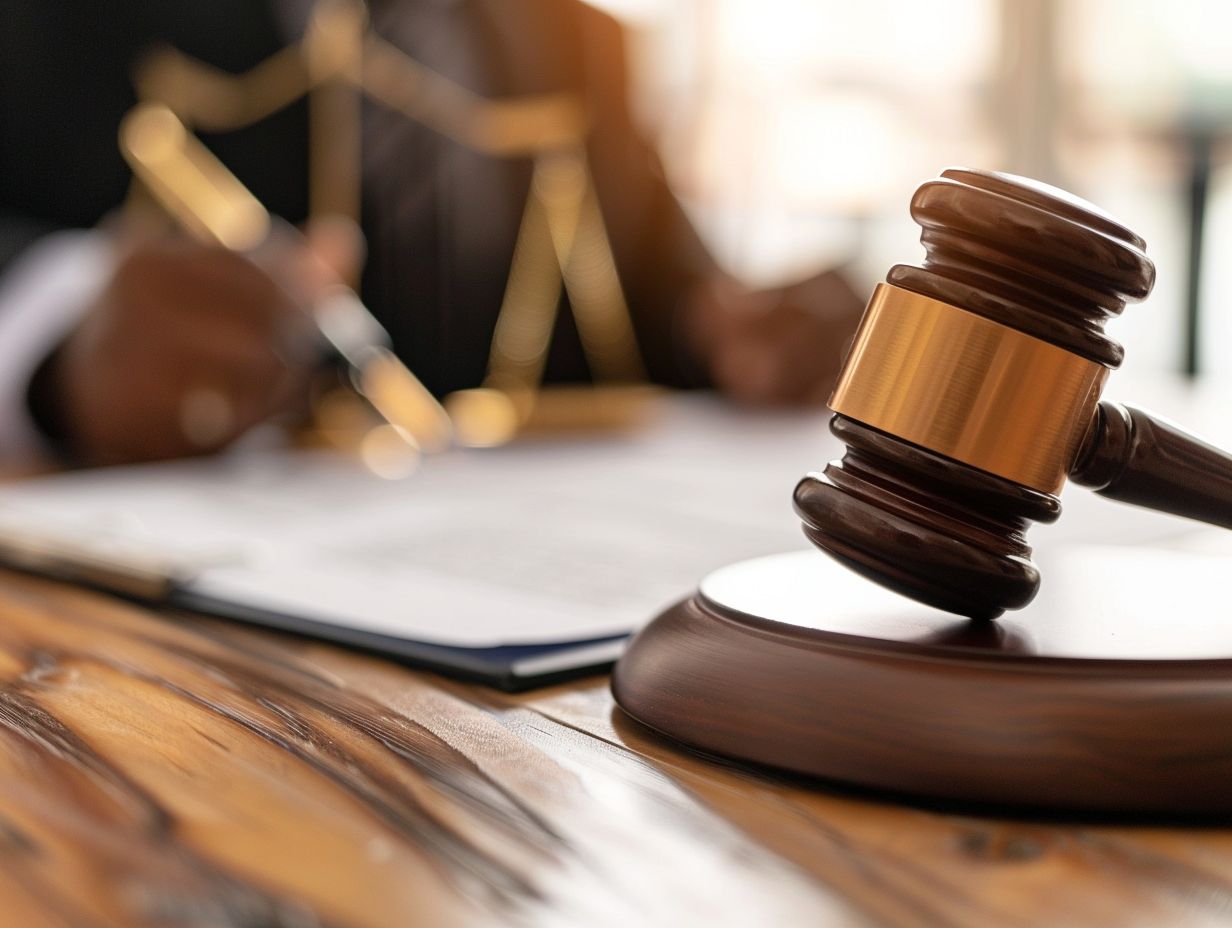Are you a Florida resident wondering about the significance of having a will? Look no further!
In this article, we will explore the key reasons why having a will is crucial in the Sunshine State.
From protecting your assets to avoiding family conflicts, we will delve into the importance of this legal document.
We will discuss the consequences of dying without a will in Florida and provide a step-by-step guide on how to create one.
Don’t miss out on this essential information!
Key Takeaways:

- Having a will in Florida is crucial to protect your assets, choose your beneficiaries, and name a guardian for your children.
- Without a will, the state’s intestacy laws will determine how your assets are distributed and may lead to family conflicts.
- To create a will in Florida, determine your assets, choose an executor, decide on beneficiaries, and sign and store your will in a safe place.
What Is a Will?
A will is a legal document that outlines the wishes regarding the distribution of assets and property after death, ensuring that the estate is managed according to Florida law.
Key components within a will are essential for clarity and enforcement. These components typically include:
- The appointment of an executor who will oversee the distribution of assets
- The naming of beneficiaries who will inherit specific belongings or sums of money
- Instructions on how debts and taxes should be settled
By having a will in place, individuals have the opportunity to dictate how they want their estate divided among loved ones, charities, or other entities, providing peace of mind and avoiding potential conflicts over inheritance.
Why Is Having a Will Important?
It is essential to have a will to safeguard your assets and ensure that your estate is handled in line with your instructions, which can help avoid prolonged and expensive probate procedures as per Florida law.
1. Protects Your Assets and Property
A will ensures that assets and property are distributed according to the individual’s wishes, providing legal protection for the estate.
In Florida, having a properly executed will is crucial to avoid confusion or disputes regarding the distribution of assets after passing away. By clearly outlining who should inherit the property and possessions, a will helps prevent misunderstandings among family members and beneficiaries.
Under Florida law, a valid will can provide peace of mind knowing that wishes will be respected and legally upheld. This legal document also allows the individual to appoint guardians for minor children, specify funeral arrangements, and designate an executor to oversee the distribution process.
2. Allows You to Choose Your Beneficiaries
One of the advantages of having a will is the ability to select your beneficiaries, ensuring that your estate is distributed to the individuals you value the most.
By outlining your beneficiaries in your will, you can make clear decisions on who will receive your assets and possessions after you pass away.
This approach helps to avoid any confusion or disagreements among family members and loved ones regarding the allocation of your estate. It allows you to provide for specific individuals or charitable organizations that have special significance in your life, ensuring that your wishes are respected and fulfilled.
Therefore, taking the time to identify and assign beneficiaries in your will is an important aspect of estate planning that can provide peace of mind and assurance for you and your loved ones.
3. Names a Guardian for Minor Children
A will allows for the designation of a guardian for minor children, ensuring their care and well-being if the individual passes away.
This decision can bring peace of mind to parents, as it ensures that their children will be cared for by a trusted individual. Along with the emotional reassurance it provides, naming a guardian in a will can help prevent potential disagreements or uncertainties within the family regarding the children’s care.
By naming a guardian, a smoother transition for the children during a difficult time can be ensured, promoting stability and continuity in their upbringing. This proactive measure can have a positive impact on family dynamics and relationships, offering assurance and support to all parties involved.
4. Avoids Intestacy Laws
Having a will can help avoid intestacy laws, which would otherwise determine the distribution of your estate according to Florida law in the event of your death.
These laws are designed to oversee the allocation of assets and property in cases where someone passes away without a will. Without a will, the state’s predetermined regulations may not align with your specific wishes for the distribution of your estate.
By establishing a will, you have the ability to name beneficiaries, outline how your assets should be distributed, and designate guardians for minors. This control ensures that your estate is distributed according to your preferences rather than a standard legal framework.
5. Reduces Family Conflict
A well-drafted will can play a significant role in reducing family conflict by clearly outlining the distribution of one’s estate. By specifying the beneficiaries for each asset, a will can help prevent misunderstandings and disputes among family members after the individual’s passing.
Additionally, a will allows the individual to designate guardians for minor children or dependents, ensuring their care and well-being. Furthermore, a will can be used to establish trust funds or make charitable donations, providing control over the destination of assets and potentially minimizing conflicts among beneficiaries.
6. Provides Peace of Mind
Creating a will provides individuals with peace of mind by ensuring that their estate planning is in order and their loved ones will be looked after according to their wishes.
Along with the practical aspects, having a will can also offer emotional and psychological benefits. By outlining preferences for asset distribution, guardianship of children, and healthcare directives, individuals take control of important decisions and ensure that their legacy reflects their values.
This sense of control and organization can alleviate anxiety and uncertainty for both the individual and their family members. It can also foster a sense of responsibility and preparedness, creating a foundation for long-term financial and emotional well-being.
What Happens If You Die Without a Will in Florida?
If a person passes away without a will in Florida, their estate will be distributed in accordance with the state’s intestacy laws. This can potentially lead to unintended outcomes for their assets and family members, and may also result in a prolonged probate process.
1. State Intestacy Laws Determine Distribution of Assets
Under Florida law, in the event of an individual’s passing without a will, state intestacy laws will determine the distribution of their assets, which may not align with their personal wishes.
These laws outline a hierarchy of heirs who are eligible to inherit the deceased individual’s property. For example, in Florida, if a person dies without a will and is survived by a spouse and children, the spouse will receive a significant portion of the estate, with the remainder divided among the children.
This predetermined hierarchy may not accurately reflect the individual’s wishes regarding asset distribution. Therefore, it is important for individuals to draft a will to ensure that their assets are distributed according to their specific intentions and preferences.
2. Court Appoints an Administrator for Your Estate
If an individual passes away without a will, the court will designate an administrator to oversee and allocate their estate, potentially deviating from the deceased’s personal preferences. The court-appointed administrator is generally a professional such as a lawyer or financial advisor, responsible for ensuring that the assets are distributed in accordance with the state’s laws of intestacy.
In the absence of a will, the administrator lacks guidance on the deceased’s specific wishes or intentions, potentially resulting in disagreements among family members regarding the estate’s management and distribution. These conflicts can lead to delays and financial losses.
3. No Say in Who Inherits Your Assets
The absence of a will results in the lack of control over the distribution of assets, with state intestacy laws determining the beneficiaries and potentially excluding intended heirs.
This loss of control can lead to conflicts among family members and loved ones, potentially causing rifts that could have been prevented with a clear will in place.
In the absence of a will, the court will appoint an administrator to oversee the asset distribution, which can increase costs and delay the process. The absence of a will may also lead to higher tax implications on the estate, reducing the final amount received by beneficiaries.
Creating a will proactively ensures that assets are distributed according to the individual’s wishes, offering peace of mind and security for loved ones.
4. Potential for Family Disputes
The absence of a will can lead to potential family disputes over the distribution of the estate, which may result in prolonged probate proceedings. This lack of clear guidance on how assets should be divided among loved ones can create tension and animosity within the family.
Without a will in place, the probate process becomes more complex and lengthy, as the court must intervene to determine asset distribution according to state laws. This not only adds financial strain due to legal fees but also prolongs emotional distress for heirs.
Therefore, having a well-thought-out estate plan is crucial to avoid conflicts and ensure a smooth transition of the estate.
How to Create a Will in Florida?
Creating a will in Florida requires several important steps, including:
- Identifying assets and debts
- Selecting beneficiaries
- Appointing an executor, usually with the assistance of an Estate Planning Attorney
1. Determine Your Assets and Debts
The initial step in creating a will involves identifying all assets and debts to gain a thorough understanding of the estate’s value. This inventorying procedure serves to assess the financial status of the estate and is crucial for successful estate planning.
By creating a comprehensive list of assets, including real estate, investments, and personal belongings, as well as debts like mortgages or loans, individuals can guarantee that their will aligns with their intentions after they pass away. This information is vital for deciding the distribution of assets, clearing debts, and minimizing conflicts among beneficiaries throughout the estate administration phase.
2. Choose an Executor
The selection of an executor for a will is a crucial decision, as this individual will be responsible for the management and distribution of the estate in accordance with the wishes outlined.
The role of the executor carries significant weight, involving tasks such as asset identification and valuation, debt and tax settlement, and the proper execution of distributions to beneficiaries.
When choosing an executor, characteristics to consider include trustworthiness, organizational skills, and effective communication. It is recommended to select a person who is financially competent or has access to professional guidance as needed. An adept executor should also possess attention to detail and the ability to address any conflicts or obstacles that may arise during the probate proceedings.
3. Decide on Beneficiaries and Their Shares
Determining beneficiaries and their allocations is a crucial aspect of will creation, ensuring the distribution of your estate aligns with your wishes.
When selecting beneficiaries, it is important to consider individuals who are significant in your life and whom you intend to benefit from your assets. Some individuals may choose to divide their estate equally among their children, while others might include close friends or charitable organizations.
Regularly reviewing beneficiary designations, particularly following significant life events like marriage, divorce, or the birth of a child, is also vital. Legal considerations are involved in determining beneficiaries, as these choices can affect inheritance taxes and the probate process.
4. Name a Guardian for Minor Children
Designating a guardian for minor children in a will is important to ensure their well-being and care in the event of the individual’s passing.
This decision carries significant importance as it dictates who will take on the responsibility of raising the children if the parent is no longer able to do so.
By naming a guardian, clarity and guidance are provided during a challenging and uncertain time for the family. This not only guarantees that the children will be looked after in accordance with the parent’s wishes but also helps prevent potential conflicts or confusion among family members.
Selecting a guardian is a highly personal decision that necessitates careful consideration of the individual’s values, beliefs, parenting approach, and capacity to offer a stable and nurturing environment for the children.
5. Sign and Witness Your Will
The final step in creating a valid will involves signing and witnessing the document according to legal requirements to ensure its enforceability.
In the United States, the process of signing and witnessing a will varies from state to state, with each jurisdiction having specific rules that must be followed to ensure the validity of the document.
For example, some states may require the testator to sign the will in the presence of two or more witnesses who also sign the document. It is important to familiarize oneself with the state-specific laws governing wills to avoid any potential challenges to the will’s validity during the probate process.
6. Store Your Will in a Safe Place
After your will is signed and witnessed, it is important to store it in a secure location that is easily accessible to your executor and family when necessary.
Consider storing your will in a fireproof safe at home, a secure location at your bank, with your lawyer, or a trusted family member. Informing your executor and close family members about the location of the will is crucial.
This transparency ensures that, in the event of your passing, the necessary individuals can quickly locate the will. Keeping key individuals informed helps eliminate uncertainties and simplifies the process of carrying out your wishes as outlined in the will.
Frequently Asked Questions
What is the importance of having a will in Florida?
The importance of having a will in Florida cannot be overstated. A will is a legal document that outlines how your assets will be distributed after your death. It also allows you to name a guardian for your minor children and specify your final wishes. Without a will, the state will decide how your assets are distributed, which may not align with your wishes.
Who needs to have a will in Florida?
Anyone who owns assets and wants to have control over how those assets are distributed after their death should have a will. This includes both individuals and couples, regardless of their age or financial status.
What happens if I die without a will in Florida?
If you die without a will in Florida, your assets will be distributed according to the state’s intestacy laws. This means that your assets may go to relatives you did not intend to inherit from you, or even to the state itself. It is important to have a will to ensure your wishes are carried out after your death.
Can I make changes to my will in Florida?
Yes, you can make changes to your will in Florida at any time. It is recommended to review and update your will regularly, especially after major life events such as marriage, divorce, or the birth of a child. You can make changes by creating a new will or by creating a codicil, which is an amendment to your existing will.
Do I need a lawyer to create a will in Florida?
While it is not required by law to have a lawyer create your will in Florida, it is highly recommended. A lawyer can ensure your will is legally valid and can help you navigate any complex or unique situations. They can also provide guidance on how to structure your will to best protect your assets and carry out your wishes.
Is a will the only document I need to protect my assets in Florida?
No, a will may not cover all of your assets and may not be able to address certain situations. It is important to also consider creating a trust, which can provide additional protection and flexibility for your assets. Consult with a lawyer to determine the best estate planning tools for your specific needs.
























Rate this article:
Average rating 0 / 5. Vote count: 0
No votes so far! Be the first to rate this post.
No Comments yet!